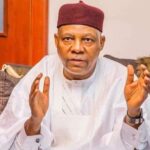Gideon Adeyemi’s revolutionary journey across various African states advocating the dismantling of colonial boundaries serves as a powerful inspiration. This piece delves into the historical roots of African partitioning, exploring the disruptive impact of the Berlin Conference of 1884/1885.
The examination extends to the consequences of colonial borders on trade, identity and conflicts in Africa. Ultimately, the essay advocates the renegotiation of a unified African identity and the imperative of visionary leadership in transcending the lingering impacts of colonialism.
Africa’s separation originates from the Berlin Conference, where European powers convened to arbitrarily partition the continent. This colonial endeavour disrupted the natural evolution of states in Africa, imposing artificial boundaries that disregard ethnic, cultural and historical affinities among various communities. The consequences of this division continue to reverberate across the continent.
Colonial boundaries have significantly impeded trade in Africa. The expansionist agenda of colonialists forced ethnic groups with shared historical and cultural ties to be divided along these partitions. As a result, nations that would have naturally engaged in trade and collaboration found themselves separated, hindering economic development and fostering a sense of fragmentation.
Insurgency, banditry thrive because internal security compromised – former A/Ibom CP
NIGERIA DAILY: I Prepared Spaghetti With Only Palm Oil Because Of Harsh Economy – Nigerian
The damage caused by colonial partitioning extends to social and identity realms. Communities with shared historical origins now find themselves constrained within different national identities. During the post-independence era, African countries faced challenges in integrating regions with similar historical backgrounds, leading to confusion and conflicts over cultural and historical affiliations.
Colonial borders have been a source of territorial conflicts in Africa. Examples such as the Bakassi Peninsula conflict between Nigeria and Cameroon, the South Sudan-Uganda conflict and the Somalia-Ethiopia territorial dispute illustrate the deep-seated issues arising from arbitrary boundary demarcations. These conflicts often lead to humanitarian crises and hinder collective progress.
The political landscape in post-colonial Africa was shaped by the merger of diverse ethnic groups with different orientations and cultures. This forced integration has often led to power struggles, internal conflicts and challenges in nation building. The institutionalisation of these divisions during colonialism laid the groundwork for post-colonial xenophobia and internal hostilities.
Communities that once shared commonalities were forced into different national identities, breeding mistrust and animosity. The legacy of these divisions continues to manifest in contemporary society, hindering social cohesion.
To address the repercussions of colonial partitioning, there is an urgent need for African nations to renegotiate their shattered identities. This involves acknowledging shared historical and cultural ties across borders and fostering a sense of unity and collaboration. Reconstructing a collective African identity requires visionary leaders committed to transcending colonial legacies.
Unfortunately, some individuals within African societies are more inclined to defend the colonial legacy than to dismantle it. This resistance poses a significant challenge to efforts aimed at renegotiating a unified African identity. Overcoming this resistance requires comprehensive educational initiatives, fostering awareness of the detrimental impacts of colonialism on collective progress.
In present day Africa, what is needed most is a complete detachment from colonial exploiters. It is crucial to recognise that colonial boundaries are arbitrary delineations that do not define the true essence of African identity. Visionary leadership is paramount in steering the continent towards unity, economic collaboration, and the reconstruction of a collective identity that transcends artificial colonial divisions.
Breaking the colonial partitions that continue to hinder Africa’s progress requires a multifaceted approach.
Understanding the historical roots, acknowledging the social, economic, and political consequences, and actively working towards renegotiating a unified African identity are essential steps. Visionary leaders must lead the charge in dismantling the remnants of colonialism, fostering a sense of unity, and paving the way for a prosperous and united Africa.
Matthew Alugbin, PhD, teaches at the Edo State University, Uzairue
 Join Daily Trust WhatsApp Community For Quick Access To News and Happenings Around You.
Join Daily Trust WhatsApp Community For Quick Access To News and Happenings Around You.


